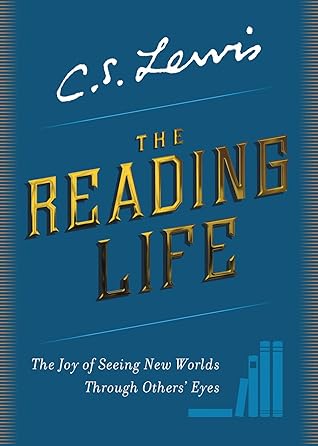More on this book
Community
Kindle Notes & Highlights
by
C.S. Lewis
Read between
September 16 - September 22, 2020
he found a book unprofitable, as he did Byron’s Don Juan, he simply wrote on the inside back cover “Never again.”
Each of us by nature sees the whole world from one point of view with a perspective and a selectiveness peculiar to himself. And even when we build disinterested fantasies, they are saturated with, and limited by, our own psychology.
Obviously this process can be described either as an enlargement or as a temporary annihilation of the self. But that is an old paradox; ‘he that loseth his life shall save it’.
When I became a man I put away childish things, including the fear of childishness and the desire to be very grown up.
far higher than, in nature, it need be. (3) The whole association of fairy tale and fantasy with childhood is local and accidental. I hope everyone has read Tolkien’s essay on fairy tales, which is perhaps the most important contribution to the subject that anyone has yet made.
I think what profess to be realistic stories for children are far more likely to deceive them.
And I think it possible that by confining your child to blameless stories of child life in which nothing at all alarming ever happens, you would fail to banish the terrors, and would succeed in banishing all that can ennoble them or make them endurable. For in the fairy tales, side by side with the terrible figures, we find the immemorial comforters and protectors, the radiant ones; and the terrible figures are not merely terrible, but sublime.
I will even go further. If I could have escaped all my own night-fears at the price of never having known ‘faerie’, would I now be the gainer by that bargain? I am not speaking carelessly. The fears were very bad. But I think the price would have been too high.
If you join at eleven o’clock a conversation which began at eight you will often not see the real bearing of what is said.
The only safety is to have a standard of plain, central Christianity (‘mere
Christianity’ as Baxter called it) which puts the controversies of the moment in their proper perspective. Such a standard can be acquired only from the old books.
The happiness which it presents to us is in fact full of the simplest and most attainable things—food, sleep, exercise, friendship, the face of nature, even (in a sense) religion. That ‘simple but sustaining meal’ of ‘bacon and broad beans and a macaroni pudding’ which Rat gave to his friends has, I doubt not, helped down many a real nursery dinner. And in the same way the whole story, paradoxically enough, strengthens our relish for real life.
My father bought all the books he read and never got rid of any of them. There were books in the study, books in the drawing room, books in the cloakroom, books (two deep) in the great bookcase on the landing, books in a bedroom, books piled as high as my shoulder in the cistern attic, books of all kinds reflecting every transient stage of my parents’ interest, books readable and unreadable, books suitable for a child and books most emphatically not.
For eating and reading are two pleasures that combine admirably.
Of course not all books are suitable for mealtime reading. It would be a kind of blasphemy to read poetry at table. What one wants is a gossipy, formless book which can be opened anywhere.
There was no question of getting through to the kernel and throwing away the shell: no question of a gilded pill. The pill was gold all through.
VERBICIDE, THE MURDER OF A WORD, HAPPENS IN many ways. Inflation is one of the commonest; those who taught us to say awfully for ‘very’, tremendous for ‘great’, sadism for ‘cruelty’, and unthinkable for ‘undesirable’ were verbicides.
It is important to notice that the danger to the word Christian comes not from its open enemies, but from its friends.
Prediction is dangerous: but The Hobbit may well prove a classic.
The Hobbit was merely a fragment torn from the author’s huge myth and adapted for children; inevitably losing something by the adaptation. The Fellowship gives us at last the lineaments of that myth ‘in their true dimensions like themselves’.
Aragorn replies that the green earth itself is ‘a mighty matter of legend’.13 The value of the myth is that it takes all the things we know and restores to them the rich significance which has been hidden by ‘the veil of familiarity’. The child enjoys his cold meat (otherwise dull to him) by pretending it is buffalo, just killed with his own bow and arrow. And the child is wise. The real meat comes back to him more savoury for having been dipped in a story; you might say that only then is it the real meat. If you are tired of the real landscape, look at it in a mirror. By putting bread, gold,
...more
The book is too original and too opulent for any final judgment on a first reading. But we know at once that it has done things to us. We are not quite the same men. And though we must ration ourselves in our re-readings, I have little doubt that the book will soon take its place among the indispensables.


